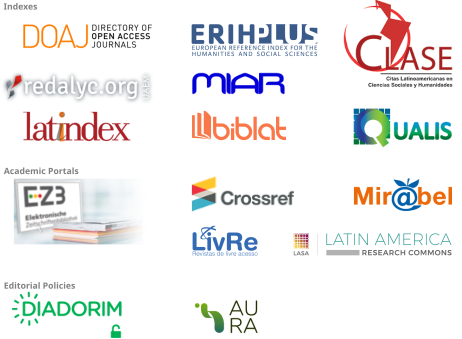About the Journal
Focus and Scope
Afro‑Ásia is a biannual publication of the Centro de Estudos Afro-Orientais (CEAO) [Center for Afro-Oriental Studies] of the Federal University of Bahia Faculty of Philosophy and Human Sciences, which publishes peer-reviewed, scholarly articles, book reviews and, in some cases, exceptionally singular primary sources in a broad range of academic disciplines on topics related to the African Diaspora, Africa, and Asia – especially history, anthropology, sociology, literature and cultural studies.
The journal fills a prominent space in Brazilian cultural life, as it is still one of the few scientific publications in Brazil that is entirely dedicated to Afro-Brazilian and African themes. Afro-Ásia also takes active part in the international debate, counting on an Editorial Advisory Board comprising experts from 16 different countries, and serving as a venue for scholarship produced in more than 20 countries throughout the Americas, Europe, Africa, and Asia. The articles section privileges the publication of in-depth and comprehensive research, as well as innovative reflections on theory and methodology. Our extensive review section has a twofold goal: to acquaint the Brazilian reader with the most recent and significant international contributions, and to showcase the best of the Brazilian scholarship to readers abroad. By providing a space of excellence for academic debate in this field, we hope to produce meaningful references for anti-racist and democratic sociopolitical action aimed at superseding the inequalities that structure the contemporary world.
Afro‑Ásia offers full open access (free, unlimited and immediate) to its whole collection, and does not require that authors pay any type of article processing charge (APC) or other fee. The journal also does not apply a minimum-degree policy for authors. Afro‑Ásia will consider submissions in English, French, or Spanish, but a professional-level translation into Portuguese must be provided by the author if the article is accepted for publication.
Manuscripts may be submitted at any time. All submissions will pass through an initial review by the editors, and then through a double-blind peer review. Authors are asked to observe a two-year interval between publication and a new submission.
Peer Review Process
Manuscripts should be prepared taking into account the requirements of a double-blind review process (see Assuring a Double-Blind Review).
Submissions are subject to a two-phase review process. Upon submission, the editors will evaluate the manuscript’s relevance to the focus and scope of the journal, as well as its compliance with scholarly writing standards and the journal’s own citation style, and run a plagiarism verification through specialized software. At that point, the editors will either inform the author that the submission has been declined or will initiate double-blind peer review. Validated submissions will be sent to two experts suggested by the editors or members of the Editorial Board. The review process usually takes around 90 days but also depends on the schedules of the reviewers, whose service is voluntary.
Reviewers can accept, reject or demand revisions to the manuscript. Revisions are required even when demanded by a single reviewer. In case of divergent assessments (acceptance and refusal), the editors will resort to a third reviewer, which may incur delays in arriving at a final editorial decision. The editors may decide, at their discretion, to reject a manuscript based on a single thoroughly argued negative assessment, or when the revisions deemed necessary for publication imply substantial rewriting. It is also important to note that, in a few exceptional instances, when an article deals with an especially arcane subject, the decision may be based on a single review, in order to avoid excessive delays in locating a second reviewer.
For the sake of transparency, Afro-Ásia lists the Reviewers who contributed to the editorial assessment of submitted articles in the previous two years, as well as our Review Form, where prospective authors can find the guidance and criteria that govern the peer review process. Authors, editors, and reviewers should carefully observe the standards described in our declaration on Publication Ethics, based on the Committee on Publication Ethics (COPE) guidelines.
Publication Frequency
Biannual
Open Access Policy
This journal offers full open access (free, universal, and immediate) to its contents, under a Creative Commons Attribution version 4.0 license (CC-BY 4.0).
Archiving
Afro-Ásia uses LOCKSS and CLOCKSS to create a distributed digital archive among participant libraries, allowing the creation of permanent copies of the journal for preservation and restoring.
Afro-Ásia is archived in the Cariniana Network, run by the Brazilian Institute for Scientific and Technological Information (IBICT).
Sponsorship
The journal is jointly supported and managed by the Graduate Program in Ethnic and African Studies (Pós-Afro) and the Graduate Program in History (PPGH), with technical support from EdUFBA and the University Libraries.
Indexing
Afro‑Ásia is indexed by:
- Directory of Open Access Journals (DOAJ);
- Red de Revistas Científicas (redalyc);
- Sistema Regional de Información en Línea para Revistas Científicas de América Latina, el Caribe, España y Portugal (Latindex);
- European Reference Index for the Humanities (ERIHPlus);
- Citas Latinoamericanas en Ciencias Sociales y Humanidades (CLASE);
- Bibliografía Latinoamericana (biblat);
- Matriz de Información para el Análisis de Revistas (MIAR);
- Qualis-Periódicos.
The journal entire collection can be reached through the following academic portals:
- Latin America Research Commons (LARC);
- Elektronische Zeitschriftenbibliothek (EZB);
- Livre – Revistas de livre acesso;
- Mir@bel;
- Crossref.
Our editorial policies are registered in:




